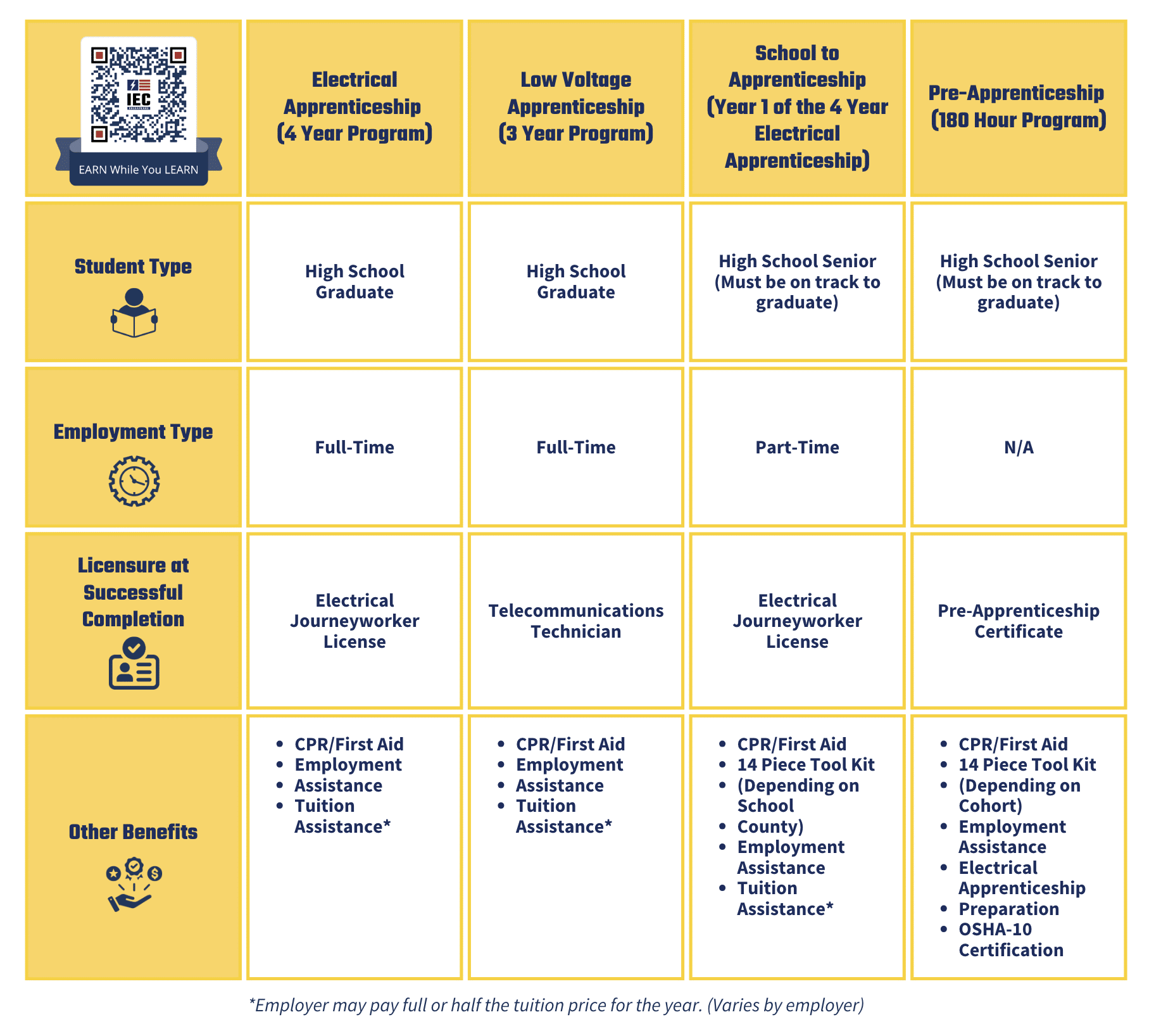Overview of Electrical Trade Careers in Washington, MD, by 2025
If you're exploring electrical trade careers in Washington, MD, you'll need a license or certification to work, starting with an apprenticeship that can take 4-5 years to complete. The process involves meeting basic requirements, gaining hands-on experience, and potentially advancing to a journeyman or master electrician status, with costs for training typically covered through apprenticeships that combine paid work and education; expect salaries starting around $60,000 annually based on national and regional data, with job growth projected at 15% in Maryland from 2020 to 2030. This article breaks down the steps, qualifications, and prospects to help you navigate this rewarding profession 12.
Understand the Role of an Electrician
Electricians in Washington, MD, are skilled professionals who install, maintain, and repair electrical systems in residential, commercial, and industrial settings. This includes working with wiring, lighting, power systems, and emerging technologies like renewable energy installations, ensuring everything complies with local safety standards and codes.

To thrive in this field, you'll handle everything from troubleshooting electrical issues to integrating smart technologies, making it a dynamic career with opportunities for growth as demand rises due to infrastructure upgrades and sustainability initiatives 34.
Do You Need a License to Work as an Electrician in Washington, MD?
Yes, a license is required to work unsupervised as an electrician in Washington, MD. The Maryland State Board of Electricians oversees licensing, and you'll typically start with an apprentice license before progressing to a journeyman or master electrician level as outlined by the Department of Labor, Licensing and Regulation 2.
Without a proper license, you risk legal penalties, so beginning with an approved apprenticeship is essential to build the necessary qualifications and ensure compliance with state regulations 1. Use Gild to explore local opportunities and stay informed on requirements.
Electrical Apprenticeship Requirements and How to Find One

Electrical apprenticeships in Washington, MD, generally last 4-5 years, involving about 2,000 hours of paid on-the-job training annually, combined with classroom instruction. Key programs include those from the Washington DC Joint Apprenticeship and Training Committee (IBEW Local 26) or non-union options through the Independent Electrical Contractors (IEC) Chesapeake Chapter 12.
To qualify, you must be at least 18 years old, have a high school diploma or equivalent, and pass requirements like drug tests and physical assessments. Here's a quick overview of apprenticeship paths:
| Apprenticeship Type |
Duration (Years) |
Key Providers |
| Union-Based (e.g., IBEW) |
4-5 |
Washington DC JATC in Lanham, MD |
| Non-Union |
4 |
IEC Chesapeake Chapter via Howard Community College |
| Other Options |
4-5 |
Associated Builders and Contractors (ABC) chapters 15 |
Start your search on Gild for current apprenticeship listings, or contact local unions to apply and kickstart your career 6.
Steps to Becoming an Electrician in Washington, MD
1. Meet the Basic Requirements
To begin, ensure you meet the fundamentals: be at least 18 years old, hold a high school diploma or GED, and demonstrate the ability to read and understand technical instructions. Coursework in math and science can give you an edge in this hands-on field 2.
2. Enroll in a Training Program
While not mandatory, programs at Maryland community colleges or technical schools like North American Trade Schools provide foundational knowledge in electrical codes, safety practices, and blueprint reading. These often offer credits toward apprenticeships, helping you earn while you learn 75.
3. Start an Apprenticeship
This is the core step, where you'll gain practical experience under supervision. Apply through Gild for openings or join organizations like IEC for non-union paths. Expect a mix of work and classes, leading to your journeyman license after completion 1.
4. Obtain a Journeyman Electrician License
After your apprenticeship, apply for a journeyman license by proving at least five years of experience, including one year in Maryland, and passing required exams. This allows you to work independently and take on more responsibilities 2.
5. Advance to Master Electrician
For career growth, aim for a master electrician license after at least two years as a journeyman. This involves passing advanced exams and enables you to supervise projects or start your own business, with potential salaries exceeding $76,000 annually 34.
Emerging Trends and Challenges in Electrical Trades
By 2025, trends like renewable energy and smart technologies will impact jobs in Washington, MD, creating demand for skills in solar installations and energy-efficient systems. However, challenges such as workforce shortages—with projections of a 14% decline in workers by 2030—mean competition for roles, though apprenticeships are on the rise with nearly 16,000 active programs in Maryland 15.

To stay ahead, pursue ongoing training through local colleges or certifications from national bodies, ensuring you adapt to regulatory changes and technological advancements 6.
Career Prospects and Salary Expectations
In Washington, MD, electrical trade careers offer strong growth at 15% through 2030, with annual job openings around 2,200 in Maryland, driven by infrastructure and renewable projects. Salaries start at about $60,000 for entry-level roles, potentially reaching $62,350 median nationally, and higher in competitive regions 34.
Compared to neighboring states like Washington state, where growth hits 18%, Washington, MD, provides solid opportunities with competitive wages, making it a smart choice for long-term stability 62. Check Gild for job listings and take the next step toward a thriving career.
Your Next Steps
Starting an electrical trade career in Washington, MD, offers high demand and rewarding pay—explore apprenticeships on Gild today to begin your journey. With the right training and certifications, you'll be well-positioned for 11% national growth by 2033, making now the perfect time to act and build a secure future in this essential industry.
Sources

